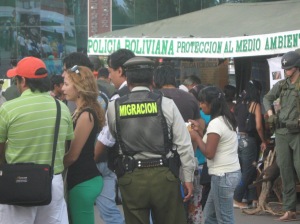
20th April- Opening Ceremony and first full day- contradictions and exciting connections
April 22, 2010Opening Ceremony
We weren’t sure about making the early morning trip to Tiquipaya for the opening ceremony, but in the end our curiosity got the better of us. We were soon installed in the stadium with thousands of others, as the sun ravenously ate the bit of shade we had found. The atmosphere was quite incredible with hundreds of flags, the majority being the Wipala, the pan-Andean flag. There were also loads of banners from local unions, some against mining, and again the massive Jesus flag!
There was a curious mixture of military bands, chants from the Argentinian youth and indigenous people’s ceremonies, at times all of them happening simultaneously. Whilst we waited for the speeches to begin there was a range of live folk music from across Latin America, and a lot of merchandise being distributed by Entel, the state telecommunications company. Their slogan is “technology to live well.” They are the co-sponsor of the conference with Coca Cola, although they are less visible. We’re not sure what they think about Coca Colla, the Bolivian alternative, which apparently does contain coca! There are many contradictions here.
After a false alarm, in which other VIPs emerged from fancy cars, Evo arrived. An array of different flavours of police, military, and men in suits with ear pieces scuttled about as the several hundred strong military band with bayonets stood to attention. Met with cheers, Evo walked down past the crowd, gave a short speech to the military which ended with “Patria o Muerte” (recently added to the army slogan), and then made his way up to the stage.
The ceremony continued with speeches from a first nation woman (Alaska), someone from India, Friends of the Earth International (Africa), Via Campesina, (Brazil), Izquierda Unidad, (Europe) and finally a message read from Eduardo Galeano. When an envoy from the UN got up to speak about how the UN process was reflecting the need for climate justice, a strong boo and hisses emerged from the crowd. The reaction was so strong to her unpopular statements that she ended up saying, “You invited me here, if you want I will go, but the international process is still important.”
Following several other local dignitaries, Evo finally began his speech. Starting about three hours after we arrived and lasting for more than an hour, we left towards the beginning. Friends report that he was very much focussed on a popular explanation of environmental problems and did not give much time to the complexities of the international processes. He talked a lot about the differences between the Bolivian traditions and the importance of these forms of knowledge in fighting climate change using metaphors of traditional ceramics v plastic plates, woven ponchos v modern plastic fabrics, Alka Seltzer v herbal treatments. It seems that this is a major theme, to establish pride in national customs as a way to resist patterns of consumption and living associated to El Norte, (the north.)
Climate and Migration Panel
In the afternoon, one of us spoke on the panel about forced migration due to climate change. Despite some early problems with the translations, which were heartily corrected by various attendees in the audience, it went well. What was most interesting was that while one of the speakers gave a very dense and technical speech about legal frameworks, the two other speakers from both North and South America made very similar political points as those that were given from a European context. Summaries of these two talks will be posted soon.
 One of the strange images from the conference, the Migration patrol and the Bolivian police for the protection of the environment.
One of the strange images from the conference, the Migration patrol and the Bolivian police for the protection of the environment.
Rising Tide
An informal meeting was held between activists from Rising Tide in Australia, Rising Tide UK, folk from the USA, and a selection of other European based climate justice activists.
Much of our discussions were around ongoing work on coal issues in both the UK and Australia, and experiences of taking direct action at points of extraction, distribution and production into electricity. This was a really interesting chat that allowed for the sharing of tactics, both of direct action and of movement building, and ideas for collaborative call outs.
Another key discussion was the call for a Global Day of Action on October 12th. Historically the date of “Colombus Day”, there has been a subverting of this pro-colonialist celebration and many indigenous groups have been using it as a day to take action around the protection of Mother Earth. An original call came from the Global Minga, a network of indigenous groups, and is being developed and built upon by activists from a variety of networks. We’ll post the call out once it is finalised, and we urge people to share it with their groups to build for worldwide autonomous direct actions.
CJN Side Event
Later we went to a Climate Justice Now (CJN) meeting, entitled “How should social movements enagage with the UNFCCC process?” There were reflections on Copenhagen and looking forward to COP-16 in Mexico later this year. One of the big questions was whether we should mobilise to Mexico, and if so how? And what other transnational strategies for action were available to us?
Over dinner we chatted with some of the folk from Mexico (including other Rising Tiders), who reflected on how weird it is for them being in the position of living in the place where the next big summit is coming, and trying to decide if/how to mobilise locally and internationally.
There is really so much other stuff going on. These are long and intense days and it gets more difficult to keep up with daily reports!



wow fun stuff dude.